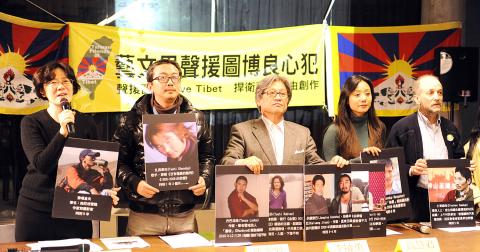Writers, musicians, an environmentalist and a student yesterday voiced their support for about 20 Tibetans arrested in recent years for their opposition to the Chinese occupation of Tibet.
“We may speak different languages, but we share a common language, which is ‘freedom,’” rapper and songwriter Chang Jui-chuan (張睿詮) told a press conference in Taipei to support Tibetan musicians, writers, filmmakers and artists arrested in China.
“We may believe in different religions, but we share one common faith — this is ‘human rights,’” Chang said.

Photo: George Tsorng, Taipei Times
Following an uprising in Tibet in 2008, the Chinese government launched a series of arrests across China that continues to this day.
The plights of the 20 Tibetans highlighted at the press conference include those of musician Tashi Dhondup, filmmaker Dhondup Wangchen and environmentalists Rinchen Samdup and Karma Samdup.
A well-known local singer in Henan Province, Tashi Dhondup released Tibetan albums The Year of 1959 in 2008 and Torture Without Trace last year — both expressing Tibetans’ nostalgia for the Dalai Lama and the suffering endured under Chinese rule.
He was detained in December for producing what Chinese authorities called “counterrevolutionary music.”
Dhondup Wangchen was arrested not long after the release of a film documenting views from ordinary Tibetans on the Olympic Games in Beijing in 2008 and was sentenced to six years in prison.
“We should condemn any country in which there are prisoners of conscience. Tibetans have the right to speak their minds and should not be arrested over things they say,” poet Lee Min-yung (李敏勇) said.
“Although China is rapidly developing, it’s still not a civilized country and it could never win respect from the world if it continues to repress freedom of expression,” Lee said.
Freddy Lim (林昶佐), lead vocalist of the metal band Chthonic said he was saddened at the thought that Tibetan musicians had to live in fear of being arrested for their art.
“I’m going to work on some new songs after the press conference and won’t have to worry. They are supposed to enjoy the same rights as I do,” he said.
Paicu Yatauyungana, a singer of the Aboriginal Tsou tribe better known as Kao Hui-chun (高慧君), said she came out to support the Tibetans because both Tibetans and Taiwanese Aborigines are oppressed peoples.
“Aborigines in Taiwan and Tibetans are all original inhabitants of their native lands, but we have both been exploited when a modern state came into our domains,” she said.
“It’s tragic that the people cannot feel relaxed while singing a song, and life is in shadow. The people cannot write articles without fear,” Yatauyungana said.
In related news, to commemorate the 52nd anniversary of the Tibetan uprising against Chinese rule in 1959, Tibetan activist groups will organize a march in Taipei beginning at 2pm tomorrow from the Zhongxiao Fuxing MRT station to Taipei 101.
A candlelight vigil remembering those who died during the 2008 uprising will be held at Liberty Square in Taipei starting at 7pm on Monday.

Taiwan is to commence mass production of the Tien Kung (天弓, “Sky Bow”) III, IV and V missiles by the second quarter of this year if the legislature approves the government’s NT$1.25 trillion (US$39.78 billion) special defense budget, an official said yesterday. Commenting on condition of anonymity, a defense official with knowledge of the matter said that the advanced systems are expected to provide crucial capabilities against ballistic and cruise missiles for the proposed “T-Dome,” an advanced, multi-layered air defense network. The Tien Kung III is an air defense missile with a maximum interception altitude of 35km. The Tien Kung IV and V

The disruption of 941 flights in and out of Taiwan due to China’s large-scale military exercises was no accident, but rather the result of a “quasi-blockade” used to simulate creating the air and sea routes needed for an amphibious landing, a military expert said. The disruptions occurred on Tuesday and lasted about 10 hours as China conducted live-fire drills in the Taiwan Strait. The Civil Aviation Administration (CAA) said the exercises affected 857 international flights and 84 domestic flights, affecting more than 100,000 travelers. Su Tzu-yun (蘇紫雲), a research fellow at the government-sponsored Institute for National Defense and Security Research, said the air

Taiwan lacks effective and cost-efficient armaments to intercept rockets, making the planned “T-Dome” interception system necessary, two experts said on Tuesday. The concerns were raised after China’s military fired two waves of rockets during live-fire drills around Taiwan on Tuesday, part of two-day exercises code-named “Justice Mission 2025.” The first wave involved 17 rockets launched at 9am from Pingtan in China’s Fujian Province, according to Lieutenant General Hsieh Jih-sheng (謝日升) of the Office of the Deputy Chief of the General Staff for Intelligence at the Ministry of National Defense. Those rockets landed 70 nautical miles (129.6km) northeast of Keelung without flying over Taiwan,

City buses in Taipei and New Taipei City, as well as the Taipei MRT, would on Saturday begin accepting QR code payments from five electronic payment providers, the Taipei Department of Transportation said yesterday. The new option would allow passengers to use the “transportation QR code” feature from EasyWallet, iPass Money, iCash Pay, Jkopay or PXPay Plus. Passengers should open their preferred electronic payment app, select the “transportation code” — not the regular payment code — unlock it, and scan the code at ticket readers or gates, General Planning Division Director-General Liu Kuo-chu (劉國著) said. People should move through the